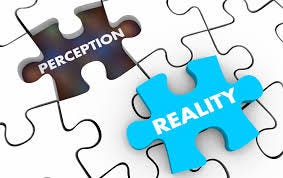Issue #767 The Choice, Friday, November 15, 2024
Please share and subscribe to help us grow this publication.
If you like us, REALLY like us, please click the “Like” button at the end of this post!
We appreciate your support!
After the 2024 election, a sharp contrast between perception and reality emerged. Realizing this difference will provide valuable insights into the influences of media, public opinion, and political strategy in the future.
Perception:
“The way of regarding, understanding, or interpreting something; a mental impression.”
Reality:
“The world or the state of things as they actually exist… existence that is absolute, self-sufficient, or objective, and not subject to human decisions or conventions.”
Perception and reality have very different meanings. Perception occurs entirely in the mind, which can turn any belief into reality. Reality exists outside of the mind and can’t be easily manipulated.
Perception is not reality, but admittedly, perception can become a person’s reality (there is a difference) because perception potently influences how we look at reality.
The Role of Media and Information Bubbles
One of the most striking aspects of the 2024 election was the role of media in shaping public perception. Leading up to the election, various polls and media narratives suggested a tightly contested race. However, the results revealed a decisive victory for one candidate, surprising many who relied on alternative media narratives.
Public Opinion vs. Electoral Outcome
Another factor contributing to the perception-reality gap was emphasizing national polls rather than a nuanced understanding of electoral dynamics. National polls painted a picture of a close race, yet they often overlooked the significant variations in voter sentiment across different states and demographic groups.
Strategic Miscalculations and Reality Checks
The 2024 election highlighted that voter decisions are more complex and motivated by factors beyond high-profile endorsements.
As we reflect on the 2024 election, it becomes clear that understanding the distinction between perception and reality is crucial for future electoral strategies and media consumption.
Our choices include carefully curing the media we consume and finding and implementing solutions as carefully as possible.
With every interaction, we have a choice to decide whether it is perception or reality.




